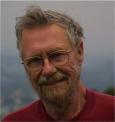School of Information Science - Hall of Fame

- Edsger W. Dijkstra
- Born: May 11, 1930
- Died: August 6, 2002
- Field: Computer science; programming languages
- Focus: Contributed significant research and theory to the industry of computer science and programming languages.
- Country: Netherlands
- Era: 1950 to 1969
Professor Edsger Dijkstra was a pioneer of the science and industry of computing. He was born in Rotterdam, The Netherlands. He graduated from the Gymnasium Erasmianum in Rotterdam and obtained degrees in mathematics and theoretical physics from the University of Leyden and a Ph.D. in computing science from the University of Amsterdam. Athens University of Economics awarded him an honorary doctorate in 2001.
Dijkstra worked as a programmer at the Mathematisch Centrum, Amsterdam, from 1952 to 1962; was professor of mathematics, Eindhoven University of Technology, from 1962 to 1984; and was a Burroughs Corporation research fellow from 1973 to 1984. He held the Schlumberger Centennial Chair in Computing Sciences at the University of Texas at Austin from 1984 to 1999, and retired as Professor Emeritus in 1999.
Dijkstra was the 1972 recipient of the A.M. Turing Award of the Association for Computing Machinery (ACM). He was a member of the Netherlands Royal Academy of Arts and Sciences, a member of the American Academy of Arts and Sciences, and a Distinguished Fellow of the British Computer Society. He received the 1974 AFIPS Harry Goode Award, the 1982 IEEE Computer Pioneer Award, and the 1989 ACM SIGCSE Award for Outstanding Contributions to Computer Science Education. In 2002, the C&C Foundation of Japan recognized Dijkstra "for his pioneering contributions to the establishment of the scientific basis for computer software through creative research in basic software theory, algorithm theory, structured programming, and semaphores."
He is well known for his shortest-path algorithm and for having designed and coded the first Algol 60 compiler. He was famously the leader in the abolition of the GOTO statement from programming.
Dijkstra was famous for his way with words, such as in his remark, "The question of whether computers can think is like the question of whether submarines can swim." The Oxford English Dictionary cites his use of the words "vector" and "stack" in a computing context.
